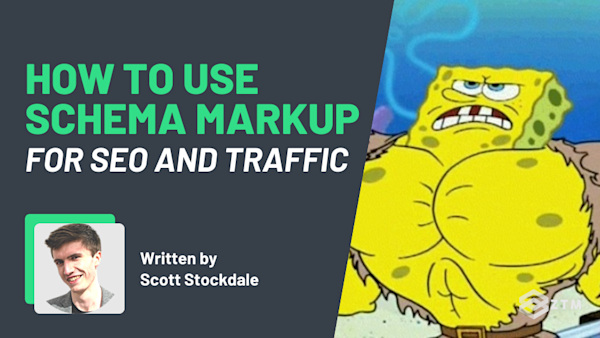Are you thinking of setting up a new website for a portfolio project or startup idea, have your credit card in hand, and are ready to click go on Godaddy for that sweet new domain name?
Well, slow down a second!
Choosing a domain name is a step many people rush, and yet it's so important because it can help establish your website's credibility and lay the foundations for all your future SEO efforts.
You don't want to get this step wrong and have to pivot to a new SEO-friendly URL structure later down the line if you can help it.
Fun fact? Google used to be called ‘Backrub’, as an ode to ‘linking back’ from sites… not great eh.

Thankfully they changed the name before they grew too large!
Also, it's worth stressing before we go any further that I have my SEO hat on here. This means that although domain names can affect branding, we're mainly going to be looking at factors that prioritize SEO, to help make your website more 'SEO-friendly' instead.
Sidenote: If you’re interested in learning more SEO so that you can take your new domain name, rank it, and get traffic, then be sure to check out my SEO Bootcamp course.
Learn SEO best practices from scratch, and get simple, actionable steps to implement to efficiently rank your website (or your clients’) on the first page of Google and start driving organic traffic to your website!
Check it out here or watch the first videos for free.
I cover a lot of ‘technical SEO’ topics in there, for site structure - as well as link-building methods.
With that out of the way, let’s dive into this guide!
Tip 1: Include a relevant keyword in your domain name where you can
Sure, it's possible to choose a company/brand/domain name after a piece of fruit (I'm looking at you Apple) but it's a heck of a lot easier, and cheaper, to choose a name that relates to what your website is about.
Not only is it easier for the audience to find and remember, but it's also far more SEO-friendly.
For example
A website that I reference in my SEO course is writingbeginner.com.

Its founder, Chris, is someone I've followed for a while on Medium, and his website's domain reflects what the website is about. i.e. He writes articles that help beginner writers get better at writing.
Now I won't lie, and Chris will be the first to admit this - his website isn't the prettiest to look at. There's very little functionality beyond standard HTML, and you can tell the logo was made on Canva.
However, the website is very successful and is generating thousands of page views every month. More than this, these pageviews are translating into ad income, affiliate income, and sales for his writing products.
Impressive stuff, and all because his audience doesn’t have trouble finding him and what he does.
Another good example of this is pcworld.co.uk

Guess what they sell? Yep, you got it. PCs and laptops to the UK market.
Tl;dr: If you want people to know what you do, and find you when they search, think about hinting at what you do with your domain name.
Tip 2: Choose a domain with .com at the end
There's little evidence to suggest that .com domains give your site a boost from an SEO point of view, and there's nothing wrong with extensions like .org or .co.uk or whatever your country code is.
However, .com is by far the most valuable domain suffix. It's also used by more than half of all websites on the internet and has become synonymous with credibility, so it's likely to make your website seem more trustworthy.

It's pretty arbitrary but unless you’re in the tech space and use .io, most people just expect websites to end in .com. If you don't have this, they'll likely think why not?
tl;dr: If the domain you want has .com available, go with it.
Tip 3: Avoid using a hyphen or weird spelling in your domain name
Don’t add weird letters or symbols in your domain name!
This isn’t a custom license plate - it’s your website, and if someone isn't sure how to spell your site, or if your domain name has all the letter e’s changed to backward 3’s, then you’re going to lose a lot of traffic opportunities.

Including a hyphen is unlikely to have a big impact from an SEO perspective, but I'd still choose a domain name that doesn't have one if possible. Domain names with hyphens can look less professional, more spammy, and are arguably more difficult to remember.
That being said, there are companies that buck this trend, but usually because of some internal changes or styling.
For example
Mercedes Benz's official website is Mercedes-benz.com

In this case, the reason Mercedes Benz includes a hyphen in their domain is this is how their brand name is spelled, and they are a huge company that existed pre-internet.
However, even with all this history, because of brand name spelling confusion with the general public, Mercedes also owns the domain mercedesbenz.com, and they redirect traffic to their hyphenated name.
tl;dr: Don’t try to make your domain name too complicated, or spelled weirdly.
Free tools to help you choose a Domain Name
With these tips in mind, here are a couple of free tools to help you choose your domain name, so you don’t have to try and come up with something from scratch, and also check if it's a good choice.
Check domain name availability with Lean Domain Search

This tool helps you get recommendations and availability of domain names, so you don’t have to come up with something awesome all on your own.
All you have to do is enter a term to get recommendations.
For example
I've played the trombone since I was 12, and I’ve always thought about building an affiliate website about this instrument, so let’s see what's available.
I entered the word and clicked search:

It then told me there are 4,871 .com domains currently available containing trombone!

So, when you scroll down, you see all these variations sorted by popularity, length, or alphabetically. Then it’s just a case of seeing which of these catch your eye.
To be clear, this list is just recommendations based on usual site name structures, the keyword, and if that combination with .com is available. You don’t have to pick these choices. They are just here to help you get a rough idea.
OK so let’s see if we like any of these options.
Most of the results for trombone looked to be two-word combinations, such as:
- TromboneOnline
- TromboneBlog
- TromboneWeb
- GoTrombone
- TromboneInc
- Etc
Let's say I wanted to go with TromboneInc.

Here’s one of two cool things about this tool:
Cool thing 1: When you click on the domain name option, it gives you the choice to buy this domain, register on Bluehost, and then create a site on WordPress.
Handy huh?
Remember: Wordpress.com is not Wordpress.org. If you want a self-hosted website, you'd want to go with register now with a hosting provider like Bluehost.
However, before we click go on that domain, let’s quickly check to see if it has existed before and if anything shady has happened.
Cool thing 2: It also searches Twitter to see if the handle is available.

The fact that there’s a social handle on Twitter could indicate there was a previous site, so let's dig deeper before deciding to grab it.
Check site history in Wayback Machine
One of my favorite SEO tools ever in SEO is web.archive.org - otherwise known as Wayback Machine.

This website lets you see what web pages used to look like over the years.
For example
Here’s what Google used to look like back in 1998, a few years after its name change:

What makes Wayback Machine such a useful tool is it can tell us whether a domain has been used in the past and can show us what it used to look like.
Why do we care about this?
Ideally, you’re looking to see if the site has been built before in the past, and if so, has it had any dodgy link-building activities used on it, been penalized, and now can no longer rank in search engines.
Obviously, you don’t want to grab this domain if it’ll never show up when people search for it!
For example
Let’s look at two of the sites that were recommended to use via the first tool, and then check if they are ok.
The first is ‘protrombone.com’.
If it was a totally brand-new domain, it wouldn’t show up in Wayback Machine. However, when we searched for this domain name, Wayback Machine has multiple screenshots of this domain going back as far as January 2011.
So let's take a look.

This one simply means that someone owns the domain (at the time of the screenshot) and hasn't built anything on it yet. In fact, this page is something the web host will set up.
Being parked is fine. Maybe someone bought the domain name and did nothing with it, so let’s check further.
When we click on earlier screenshots though, it shows that it was also a dodgy-looking news site:

Not a good sign - especially because trombones have nothing to do with news.
In other words, there’s history behind this domain, so for me, this would be enough of a red flag to go ahead and not buy this domain, particularly when there are other options available.
So, let's look at one of those other options - gotrombone.com
We can see that Wayback Machine has not archived that URL under this particular domain, which is a good sign.
To double check, we could also look at the HTTP version, but again, there looks to be no captures for this URL:

This suggests this domain has not been bought or used before, and it’s the perfect situation. Therefore, it's safe to go ahead and buy this domain, knowing that there's no history behind it.
We can confidently build on this, knowing there is a solid foundation, and we don't have to worry about any dodgy activities that a previous owner of this domain might have done.
Boom!
Go choose your own new domain name today!
So there you have it.
It’s fairly simple to choose a domain name that's SEO friendly, just as long as you follow these structure tips and do a little background research.
Also, if you use those free tools I mentioned, you won’t be stuck trying to come up with ideas either - making the process far easier.
I know that I’ve rushed in and bought so many random, bad domain names in the past, while other times, I’ve sat trying to think of a new blog for hours before I could figure out what to call it.

Finally, once you’ve grabbed that new domain name and want to start ranking it, be sure to check out my SEO course.
It makes SEO easy to understand and gives you simple, actionable steps to implement to efficiently rank any website on the first page of Google and start driving organic traffic to your website!
As an added bonus, you’ll not only get access to all the course content, but can also ask me, and other students, questions in our private Discord channel.






